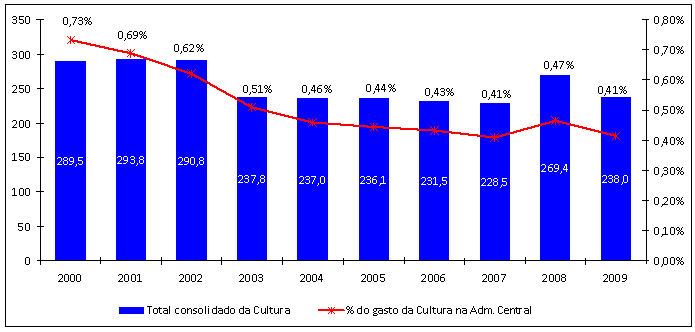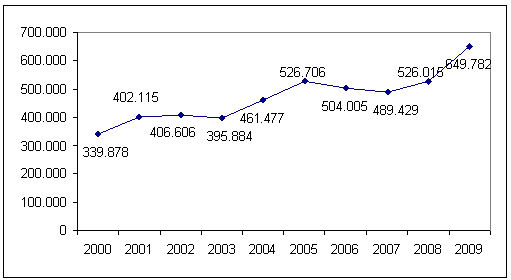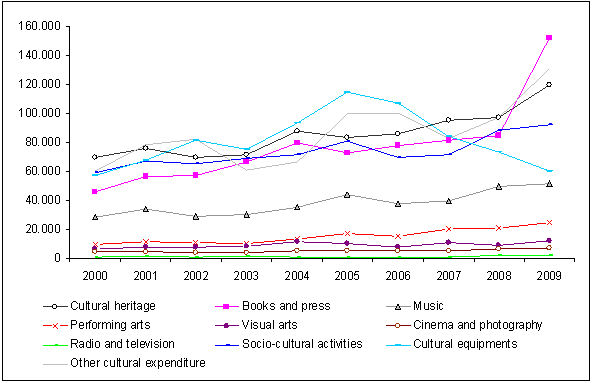7. Financing and support
Portugal
Last update: June, 2011
Public culture spending per capita by central government in 2009 was 23.5 EUR.
Public culture spending per capita by local government in 2009 was 61.1 EUR.
See also chapter 7.1.2.
Last update: June, 2011
Local government expenditure on culture surpassed central administrations by the mid-1990s. Since then this trend has became more apparent and the gap between both levels of government widened.
Table 4: Public cultural expenditure: by level of government, in million EUR, 2009
| Level of government | Total expenditure | % of total |
|---|---|---|
| State (federal) | 238.0 | 27% |
| Regional (provincial, Länder) | ---- | ---- |
| Local (municipal) | 649.7 | 73% |
| Total | 887.7 | 100.0% |
Source:
OAC from INE, Estatísticas da Cultura, Desporto e Recreio [for Local (Municipal)] and Ministry of Finances / DGO, Conta Geral do Estado [for State (federal)].
Notes:
i) Expenditure figures regarding autonomous regions of the Azores and Madeira are not available.
ii) Total Expenditure of the State (federal) only refers to continental territory.
iii) Public cultural expenditure by sector is only available with separated figures for each level (state and local authority).
iv) Percentages only indicate the approximate values.
Figure 3: State expenditure on culture, in million EUR and %, 2000-2009

Source: OAC from MFAP / DGO, CGE.
As Figure 4 shows, there was, however, a slight drop in local authority expenditure on culture for the year 2006, as well as an increase in 2005, 2008 and 2009.
Figure 4: Local government spending on culture, in thousand EUR, 2000-2009

Source: OAC from INE, Estatísticas da Cultura, Desporto e Recreio (http://www.ine.pt/).
Last update: June, 2011
Table 5: Direct state cultural expenditure by sector, in million EUR, 2008-2009*
| Domain | Direct expenditure (Ministry of Culture budget) | ||||
|---|---|---|---|---|---|
| 2005 | 2006 | 2007 | 2008 | 2009 | |
| Cultural Heritage | 109.4 | 92.7 | 86.2 | 83.1 | 82.2 |
| Archives and Libraries | 35.0 | 32.2 | 28.3 | 29.7 | 29.4 |
| Visual and Performing Arts | 79.9 | 86.5 | 83.8 | 86.8 | 47.4 |
| Cinema, Audiovisual and Multimedia | 25.2 | 22.3 | 21.6 | 20.1 | 20.6 |
| Socio-cultural Activities | 35.6 | 26.8 | 22.7 | 26.8 | 33.1 |
| TOTAL | 285.1 | 260.5 | 242.6 | 246.5 | 212.7 |
Source(s):
Ministry of Culture / Secretaria Geral.
Note:
* See also chapter 1.2.1.
Figure 5 illustrates the evolution of local authority expenditure by cultural sub domain. Over this period, expenditures increased in all cultural domains (despite since 2005 the downward trend in the expenditure on Cultural Equipment), especially those related with Cultural heritage and Books and Press.Figure 5: Local authority expenditure by cultural sub domain, in thousand EUR, 2000-2009
Figure 5: Local authority expenditure by cultural sub domain, in thousand EUR, 2000-2009

Source:
OAC from INE, Estatísticas da Cultura, Desporto e Recreio (http://www.ine.pt/).
Chapter published: 13-07-2011
Last update: June, 2011
Norms and rules have also been published for aid to theatre and dance activities. In 2003 a new system of financial supports for professional activities in the domains of Performing Arts and Contemporary Art was established. However, the support for certain areas (namely the theatre) has met with growing demands and the need of a more precise definition of funding criteria.
In 2007, the Ministry of Culture set up, through the Directorate-General of Arts and the Science Programme "Ciência Viva", a common research and work platform for artists and scientists, thus implementing the Residencies Network Programme: Art / Science Experimentation. This programme involves holding artistic residencies at various scientific host institutions. The objective is to enable artists and scientists to explore artistic and aesthetic fields using the tools from both domains. In the first edition of this programme (2007) 33 projects were submitted, of which 8 were selected. In 2009 a second edition of this programme was launched again.
The Inov-Art programme, organised by the Ministry of Culture's Directorate-General for the Arts, should also be mentioned. Its aims are to provide 200 training internships annually in established international institutions, for those aged between 18 and 35 who have recognised qualifications or skills in the cultural or artistic field. The programme was implemented for the first time in 2009.
Last update: June, 2011
Purchasing programmes concerning works in the sector of visual arts took place through the action of the Directorate-General for Arts (DGArtes) that also is responsible for annual financial support to performing arts structures.
Anyway, support for visual arts and music is derived partly from the private sector, especially after the revised Sponsorship Act, and from foundations (there are approximately 350 Foundations in Portugal, over half of them are cultural foundations subsidised by the state - see chapter 1.3).
Last update: June, 2011
Outside the usual grant systems for artists from different professional fields, special grants for literary creation have been operating since 1996. There is also support for young creators through exhibitions and prizes derived from the Ministry of Culture, local administrations and private bodies.
Significant sources of support from state bodies are as follows:
- support from the DGLB for writers to travel to fairs and festivals abroad;
- support from the National Fine Arts Academy for artists to travel abroad;
- awards in the visual arts (in illustration and photography) and cinematography, by the ICA and the CPF;
- annual awards from the National Fine Arts Academy in architecture, sculpture and painting; and
- scholarships for the creative arts, particularly in the fields of visual arts, literature and music.
The third sector, in particular foundations, plays a prominent role in awarding scholarships and prizes - the Calouste Gulbenkian Foundation, for example, which awards scholarships in various fields. In the arts field, there are scholarships for specialised study and professional development abroad; the dance support programme; and development scholarships in music.
This foundation is also important for its grants and awards for creative projects in the visual arts; for its support to new theatrical producers; for theatrical research. It also has awards for restoring and improving heritage sites (Vasco Vilalva prize); for emerging young writers of children's and young people's literature (Branquinho da Fonseca prize), among many others.
Another foundation with a key-role in providing scholarships in the artistic and cultural field is the Luso-American Development Foundation (FLAD). Of particular note is the funding provided for short-term secondments abroad in the fields of language, literature, music and musicology.
Last update: June, 2011
Professional qualifications and welfare arrangements for artists and other cultural professionals are the most recent issues that mobilise professional artists' associations.
Other issues could be mentioned, such as The Portuguese Association of Librarians, Archivists and Document Professionals (APBAD) which promoted several actions in defence of public lending in Portuguese libraries. This professional association argues that the European directive on the mandatory payment of dues on the loan of works in public libraries would undermine the vitality of public libraries in Portugal, which are struggling with severe economic constraints in order to fulfil their social function. In this context, APBAD promoted several awareness actions, including an online petition addressed to the Portuguese government and the European Commission in defence of public lending in Portuguese libraries.
Information is currently not available.
